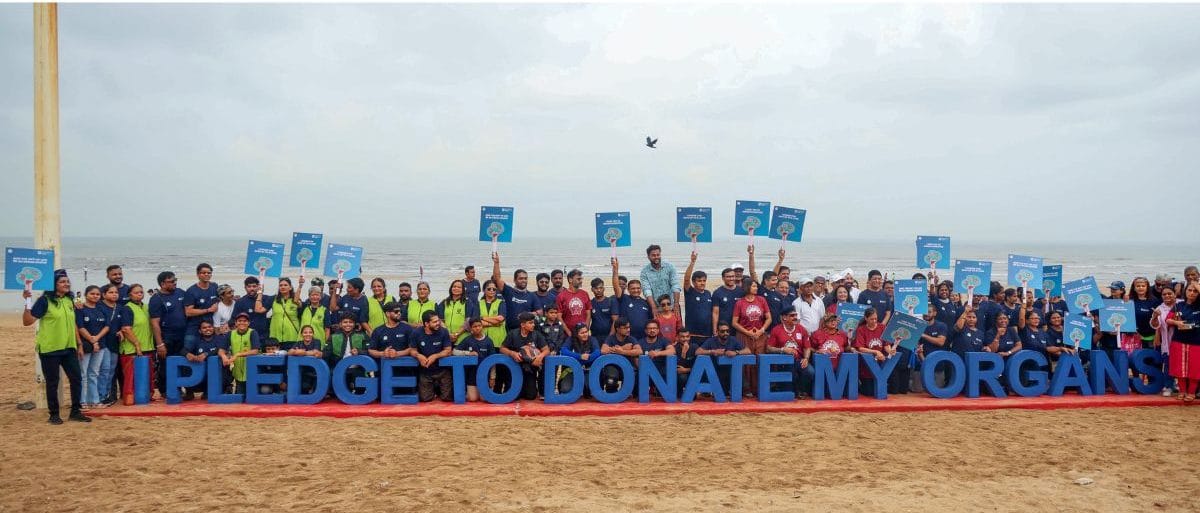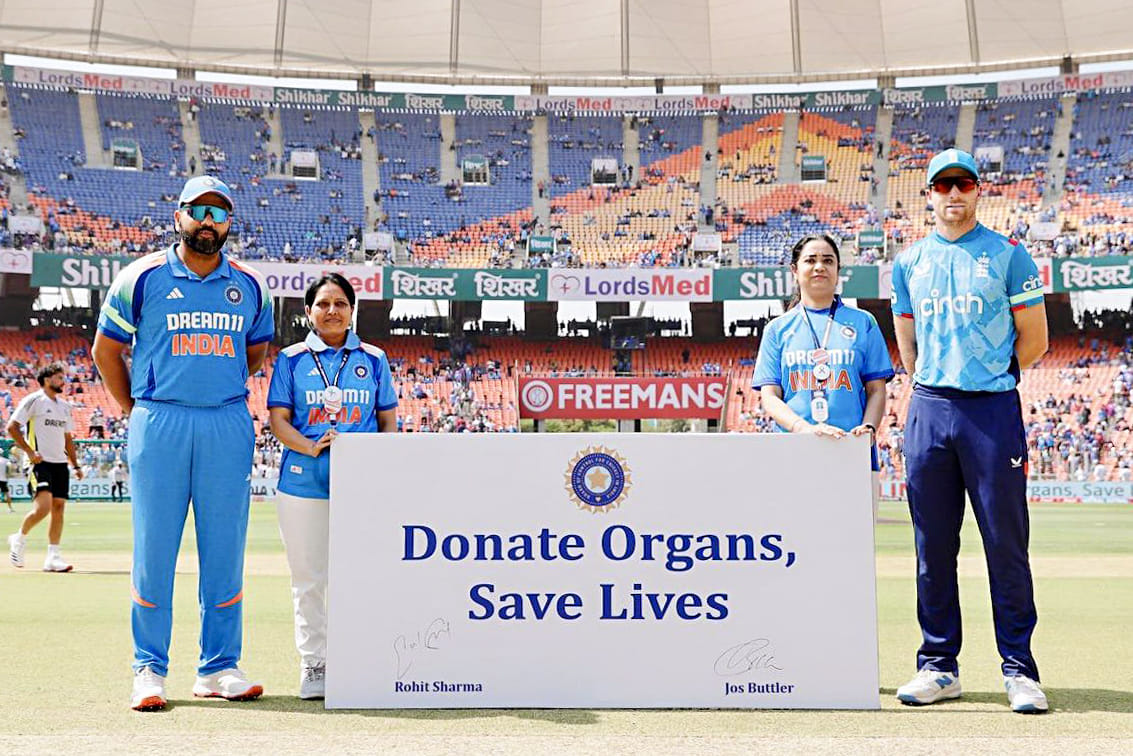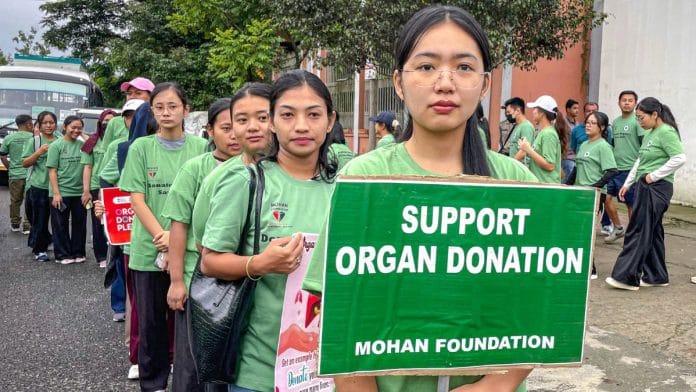New Delhi: Three years ago, Priyadarshini from Gujarat was carefree, content and confident. She had a job and an active social life. Now, her world is a single room and frequent hospital visits. She needs a kidney, but there are no donors.
“Every hospital visit is like a war. You don’t know in what condition you would make it home again,” said Priyadarshini (30), who used to work as a customer relationship manager.
Her kidney failure began with vomiting, indigestion, and weakness. That flicker of hope when her mother matched as a donor was snuffed out when doctors concluded that the transplant would be dangerous. Her mother was diagnosed with weak kidneys, making her ineligible as a donor.
“If there were more organ donors in India, or if people were more aware, perhaps my sister wouldn’t be stuck between medication and endless hospital visits,” said Priyadarshini’s elder brother, who did not wish to be named.
The number of transplants in India has soared from 4,990 in 2013 to 18,378 in 2023—that’s a whopping 268 per cent increase. The following year, 18,911 transplants took place, according to data released in August 2025 by the Union Health Ministry’s National Organ and Tissue Transplant Organisation (NOTTO). But the numbers belie a starker problem. The organ donation rate is woefully inadequate at less than one per million population.
Priyadarshini’s story is not an isolated tragedy but part of a larger crisis. At least 63,000 Indian patients are waiting for viable kidneys, and around 22,000 are in need of liver transplants. The surge in transplants over the last decade is primarily because of live donors, when family members and relatives step in to help their loved ones. But deceased organ donation is abysmally low. Cultural taboos, stigma, and superstition are not the only reasons. Trust deficit in the healthcare system, red tape, bureaucratic hurdles, along with a lack of awareness, have prevented India’s deceased organ donations from picking up. Without systemic reform and greater awareness, thousands like Priyadarshini remain caught between medication, hospitals, and waiting.
“There are no role models or big examples when it comes to organ donation. We need more prominent figures to set an example for society,” said 45-year-old Santosh Kumar Verma, who travelled from Bengaluru to Delhi in search of a liver for his father’s transplant.

Myths to misinformation
After her mother was rejected as a donor, Priyadarshini reached out to extended family members, but no one was willing to donate a kidney.
“People have their own fears and lives to live. They don’t want to take risks and live with just one kidney,” said Priyadarshini with an equanimity that belies her desperation.
She undergoes dialysis three times a week at KD Hospital in Gandhinagar, where she’s registered for a transplant. She also explored options at several government hospitals, but the donor waiting lists there were even longer, with patients waiting for over three to four years. She decided to focus on private care instead.
“I don’t know how many more months or years it will take to find a donor, or when I’ll be able to live a normal life again,” said Priyadarshini, sitting in the waiting area of KD Hospital. Holding her medical files, she waited for her name to be called for dialysis.
Every month, she unfailingly calls KD Hospital’s transplant coordinator Nikhil Vyas, hoping for a match. The soft-spoken 42-year-old man is the interlocutor between doctors, organ donors, and recipients. He coordinates with the hospital’s transplant and organ donation committee, counsels donor families, and reassures those waiting for organs.
KD Hospital performs seven to eight transplant surgeries each month, including cornea, kidney, and liver transplants. However, the number of deceased donor organ donations remains low, with only six to seven brain-dead donations occurring early.
“Hospital visits are difficult for everyone, regardless of the reason. Making patients comfortable and stress-free during their treatment journey is absolutely necessary,” said Vyas.
The entire process is a labyrinth of medical tests, red tape and paperwork. When a patient is diagnosed with organ failure—such as kidney, liver, heart, or cornea— they undergo a thorough medical evaluation to determine if they are suitable transplant candidates. Eligible patients are registered on a transplant waiting list if they don’t have a donor relative. The list is managed by hospital transplant committees or national registries.
For living donor transplants, a compatible family member or volunteer undergoes testing to confirm suitability. Both the donor and the recipient are counselled on risks and what to expect after the surgery.
In deceased donor cases, organs are matched based on blood type, tissue compatibility, urgency and waiting list numbers. Once a patient is declared brain dead, grieving family members are counselled so that they can make an informed decision on organ donation.
“However, many families refuse to consider donation for fear that the organ may be misused or because they don’t know who the recipient will be,” said Vyas. He recalled an incident where a family withdrew consent at the last moment.
“They feared the soul would not find peace or would remain trapped if the body was not whole.”
Also read: 85% of India’s transplant centres are private. Why govt hospitals are struggling to keep up
Bridging awareness gap
Today, there’s a small army of NGOs, volunteers and healthcare professionals across India trying to dispel these myths.
“With the counselling team and NGOs working actively in this space, we are now able to convince three to four families out of every 10 to agree to deceased organ donation,” said Vyas.
Such outreach is not confined to hospitals. Meetups and sessions are held in colleges, building societies and RWA meetings. NGOs like Shatayu Foundation and Mohan Foundation organise rallies, walks and marathons and fundraisers to spread the word.
In August, MOHAN Foundation—an organ donation awareness non-profit—along with the Rotary Club of Delhi, conducted an awareness session at the College of Home Economics (CHE), Hauz Khas.
More than 45 students gathered in a dimly lit room to watch a short educational film on the entire process.
“Sharing real-life stories, not only of organ donors but also of recipients and those waiting for transplants, is a key part of our campaign,” said Pallavi Kumar, executive director, MOHAN Foundation.
The students wanted to know more. What happens if we pledge our organs but our family refuses to comply? Who should we approach if they wish to donate their eyes?
The event concluded with several students coming forward to pledge their organs.
If there were more organ donors in India, or if people were more aware, perhaps my sister wouldn’t be stuck between medication and endless hospital visits
-Priyadarshini’s elder brother

“Discussions about organ donation and registering as a donor after death should become as common as dinner table conversations if we want to increase the number of donors in India,” said Kumar.
MOHAN Foundation not only supports individuals through the transplant process but also offers a range of training programmes and courses like Transplant Coordination Professional Certificate, Post Graduate Diploma in Transplant Coordination and Grief Counselling, Family Counselling & Conversations, Legal Aspects of Organ Donation.
Recently, the foundation illuminated the iconic Qutub Minar in green—the symbolic colour of organ donation—to spark curiosity and initiate conversations among the public. It also hosted a music festival at Sunder Nursery.
“Indian people are among the most generous. It’s not a lack of willingness but a lack of awareness and trust in the system,” said Kumar, adding that MOHAN Foundation registered 1,128 donors in 2025, its highest number of registrations to date.
Discussions about organ donation and registering as a donor after death should become as common as dinner table conversations if we want to increase the number of donors in India
– Pallavi Kumar, executive director, MOHAN Foundation
Living after death
Two years after his mother fell from the terrace of their Faridabad home and was declared brain dead at AIIMS, Delhi, Rakesh Kumar is proud of the family’s decision to donate her organs.
“I was worried about what my relatives would say and didn’t like the idea of being judged,” said Kumar. He added that in small towns, people often create negative narratives that organs have been sold, or that the hospital paid the family, or even that the family was indifferent to the deceased’s wishes.
“But now, I proudly say that my mother saved many lives, even after her death,” he added.
NOTTO (National Organ and Tissue Transplant Organisation), the apex body responsible for overseeing organ and tissue donation and transplantation in India, maintains a national registry of organ donors and recipients. This ensures fair organ allocation and upholds ethical and transparent transplant practices. It also collaborates with NGOs and hospital teams to raise public awareness, develop policy, and provide training for professionals involved in the transplant process.
The National Organ and Tissue Transplant Organisation (NOTTO) has introduced an online system that allows Indian citizens to pledge their organs for donation.
“Since the launch of the Aadhaar-based NOTTO online pledge website in 2023, more than 3.30 lakh citizens have pledged to donate their organs, marking a historic moment in public participation,” said Union Health Minister JP Nadda during the 15th Indian Organ Donation Day ceremony on 2 August 2025.
Health and Family Welfare department secretary, Nivedita Shukla Verma, urged states to fully utilise central government support and outlined three key areas for progress: identifying more potential donors, expanding infrastructure, and developing human resources—stressing that awareness and timeliness are essential to saving lives through ethical organ donation.
“The government is working to promote organ donation in every village and household, with increasing public participation”, she said, adding that there is still a need for timely organ donations from accident victims.
And attitudes are slowly changing. Jitendra Kumar Patel donated his father’s organs in December 2024 after he was declared brain dead. The Patel family required no counselling or persuasion to make the decision. Four years ago, they saw one of their relatives struggle for more than two years in search of a kidney donor.
“We have seen the pain and the struggle of trying to save a life every single day,” said Patel, who himself approached the doctors for organ donation. His father, Kudar Patel, aged 74 at the time of hospitalisation, was still an ideal donor candidate due to his healthy lifestyle.
“My father lives on in many people now—that brings us a different kind of peace,” Patel added. “Someone is seeing through his eyes, and someone’s long wait for a kidney—and for life—has ended.”
Indian people are among the most generous. It’s not a lack of willingness but a lack of awareness and trust in the system
– Pallavi Kumar, executive director, MOHAN Foundation.
Also read: Why nearly dozen multi-speciality private hospitals in Delhi aren’t too keen on AB-PMJAY empanelment
A long process
Doctors and counsellors, governments and hospitals celebrate every successful transplant but admit they are just a drop in the ocean. More often than not, patients find themselves mired in the legal morass and loans.
Santosh Kumar Verma (45) was working in Bengaluru when his father, CP Verma, in Delhi, was diagnosed with liver failure and needed an urgent transplant.
After extensive consultations and a long search for both a suitable donor and the right hospital, Verma decided to become the donor himself. He consulted with Medanta Hospital in Delhi, and later Fortis Hospital in Noida, where the surgery was finally carried out.
It was an emotionally fraught and financially draining period for both father and son. It took over two weeks, and the total expenses exceeded Rs 20 lakh.
“Everything was so difficult, mentally and physically. As a donor, you have to cope with the physical strain, but as a son and caregiver, you also have to take charge of everything else,” said Verma.
But the toughest phase wasn’t over yet. A few years later, his father was diagnosed with kidney failure, forcing the family to once again go through a long and exhausting medical journey filled with treatments, procedures, and another stack of medical bills.
For Dany, the father of 16-year-old Navleen Kaur from Manesar, the fight went far beyond hospital visits.
Navleen, who always had a weak immune system, was diagnosed with kidney failure in 2022. Fortunately, her father’s life partner, Jyoti Singh, was found to be a perfect match. But what should have been a hopeful turning point turned into a 14-month-long struggle.
“We never thought our real battle would begin after finding the right donor,” said Singh.
Their ordeal began at AIIMS Delhi. The hospital refused to proceed with the transplant, citing legal issues. The family then turned to Apollo Hospital in Delhi, hoping for a smoother process, but faced the same issues. According to the Transplantation of Human Organs Act (THOA) 1994, only near relatives are allowed to donate an organ during live transplantation. Near relatives include—mother, father, son, daughter, brother, sister, spouse, grandparent and grandchild. Special permission and paperwork is required for non-near relatives to donate.
Another complication was that Jyoti Singh and Dany did not have a legal marriage certificate, and Jyoti’s previous marriage had ended through a mutual and verbal separation, with no formal divorce papers.
Nikhil Vyas explained that the procedure was essential to maintain transparency and protect everyone involved.
“Every single step is essential to keep the transplant process ethically and legally valid. There have been cases where people came forward with fake relatives.”
To be accepted as an eligible donor for her step-daughter, Navleen, Jyoti needed to provide legal documents, including her divorce papers from her ex-husband and an official marriage certificate with her current husband, Dany.
First, she contacted her legal husband, and they got a divorce. It took them three months. Then she and Dany got married in an Arya Samaj ceremony and obtained a certificate. However, the hospital’s transplant committee did not accept it and requested a formal court marriage certificate instead.
It took another six months for Jyoti and Dany to complete the legal court marriage process.
“All I wanted was to save my daughter, no matter what it took,” said Jyoti Singh.
(Edited by Theres Sudeep)






